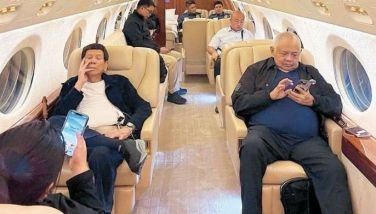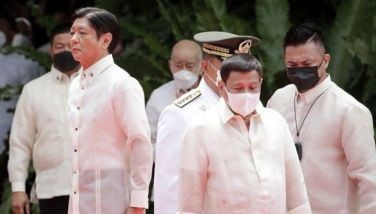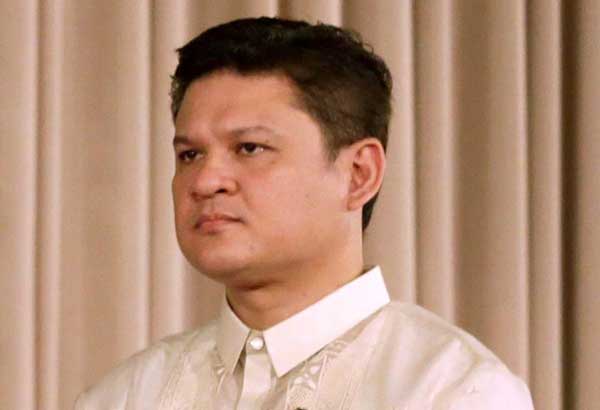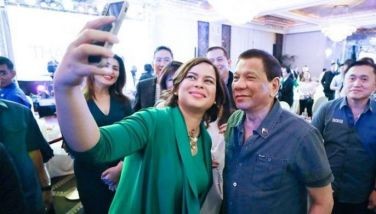Media can’t be forced to reveal sources — House
November 15, 2001 | 12:00am
The House ethics committee ruled yesterday that reporters, columnists and other media practitioners cannot be forced to reveal their sources.
Rep. Antonio Abaya (Lakas, Isabela), as committee chairman, made the ruling during the panel’s second hearing on the so-called "Gang of 5" controversy.
Abaya said under Republic Act 50 and Republic Act 1477, media practitioners have the right to protect the identities of the sources of information given to them in confidence except in matters involving national security.
"The law is the law even if it hurts," he said.
Tita Valderama of People’s Journal and this reporter, who both had written stories about the group of congressmen known as the Gang of 5, were summoned to yesterday’s hearing along with representatives of cellular phone operators Globe Telecom and Smart.
Last Sept. 5, Valderama, quoting two ranking House leaders, had written that Representatives Aniceto Saludo of Southern Leyte, Jacinto Paras of Negros Oriental, Rolex Suplico of Iloilo, Prospero Pichay Jr. of Surigao del Sur and Eduardo Veloso of Leyte had extorted money from Globe and Smart.
The five denied the accusation. The two cellular phones operators also denied having bribed any member of Congress.
In the wake of Globe’s and Smart’s denials, Saludo, who has filed a libel case against Valderama, wanted her to reveal the sources of her information about the alleged extortion.
The Journal reporter invoked her right under the law to protect her informants. She also refused to answer other questions raised by Saludo, saying her answer could be used against her in the libel case filed with the Quezon City prosecutor’s office.
It was at this point that Abaya sustained Valderama.
Not content with the ruling, the Southern Leyte congressman argued that in a case involving columnist Emil Jurado, the Supreme Court decided that the right of media practitioners under R.A. 50 and R.A. 1477 "is not absolute."
He said in the case of Jurado, he was disbarred for refusing to identify the sources of his information that there is graft and corruption in the Supreme Court.
Thus, Saludo insisted that Valderama could be compelled to reveal the identities of her informants especially in the wake of the Globe and Smart denials.
He then moved that the Journal reporter be forced to do so and if she refused, she should be detained.
Abaya suspended the hearing so committee members could discuss the motion among themselves. Later, they met behind closed doors to continue their discussions.
Emerging from their closed-door meeting, the committee chairman announced that the panel would rule on the motion in its next hearing on Nov. 20, to which Valderama and this reporter were again invited.
The ethics panel’s inquiry was prompted by a privilege speech of Veloso and two resolutions filed separately by Suplico and Pichay.
In Resolution 179, Pichay had named Majority Leader Neptali Gonzales II and Senior Deputy Majority Leader Francis Escudero as the sources of what he described as malicious reports against him and his four colleagues.
Gonzales and Escudero have denied the Surigao congressman’s accusation.
Rep. Antonio Abaya (Lakas, Isabela), as committee chairman, made the ruling during the panel’s second hearing on the so-called "Gang of 5" controversy.
Abaya said under Republic Act 50 and Republic Act 1477, media practitioners have the right to protect the identities of the sources of information given to them in confidence except in matters involving national security.
"The law is the law even if it hurts," he said.
Tita Valderama of People’s Journal and this reporter, who both had written stories about the group of congressmen known as the Gang of 5, were summoned to yesterday’s hearing along with representatives of cellular phone operators Globe Telecom and Smart.
Last Sept. 5, Valderama, quoting two ranking House leaders, had written that Representatives Aniceto Saludo of Southern Leyte, Jacinto Paras of Negros Oriental, Rolex Suplico of Iloilo, Prospero Pichay Jr. of Surigao del Sur and Eduardo Veloso of Leyte had extorted money from Globe and Smart.
The five denied the accusation. The two cellular phones operators also denied having bribed any member of Congress.
In the wake of Globe’s and Smart’s denials, Saludo, who has filed a libel case against Valderama, wanted her to reveal the sources of her information about the alleged extortion.
The Journal reporter invoked her right under the law to protect her informants. She also refused to answer other questions raised by Saludo, saying her answer could be used against her in the libel case filed with the Quezon City prosecutor’s office.
It was at this point that Abaya sustained Valderama.
Not content with the ruling, the Southern Leyte congressman argued that in a case involving columnist Emil Jurado, the Supreme Court decided that the right of media practitioners under R.A. 50 and R.A. 1477 "is not absolute."
He said in the case of Jurado, he was disbarred for refusing to identify the sources of his information that there is graft and corruption in the Supreme Court.
Thus, Saludo insisted that Valderama could be compelled to reveal the identities of her informants especially in the wake of the Globe and Smart denials.
He then moved that the Journal reporter be forced to do so and if she refused, she should be detained.
Abaya suspended the hearing so committee members could discuss the motion among themselves. Later, they met behind closed doors to continue their discussions.
Emerging from their closed-door meeting, the committee chairman announced that the panel would rule on the motion in its next hearing on Nov. 20, to which Valderama and this reporter were again invited.
The ethics panel’s inquiry was prompted by a privilege speech of Veloso and two resolutions filed separately by Suplico and Pichay.
In Resolution 179, Pichay had named Majority Leader Neptali Gonzales II and Senior Deputy Majority Leader Francis Escudero as the sources of what he described as malicious reports against him and his four colleagues.
Gonzales and Escudero have denied the Surigao congressman’s accusation.
BrandSpace Articles
<
>
- Latest
- Trending
Trending
Latest
Trending
Latest
Recommended
































